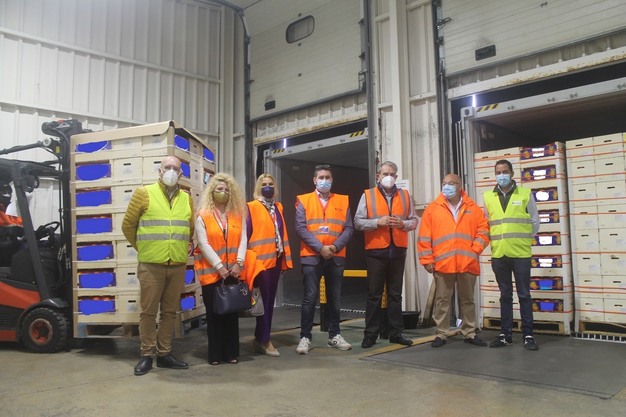A few days ago, The Gazette of India published the modification of the PQ Order, following notifying the World Trade Organization (WTO), which will allow Spain's citrus industry to make shipments of oranges(Citrus sinensis) to this market technically viable. Under this new export protocol, all Spanish operators will now be able to carry out the mandatory cold treatment in transit, during the journey to Indian ports. Until now, they had to carry it out in the goods' pre-shipment, before departure. The response of the Indian authorities comes almost four years after the Citrus Management Committee (CGC) organized a pilot test with the shipment of 243 tons of Valencia oranges to that destination. The fruit, shipped under the protocol that has now been confirmed for Spain, arrived in good condition and the cold treatment applied during the journey proved to be effective against Ceratitis capitata (Mediterranean fruit fly). The controls and analyses carried out by the Indian inspectors corroborated this. "Opening third-party markets outside the EU is a complicated task that requires the special commitment of the Government. The challenge now will be to gain a foothold in such a promising yet distant and complicated destination. India is, after all, the most populated country," stated the president of the CGC, Inmaculada Sanfeliu.
 Image of the pilot shipment made in 2021. From left to right: Juan Carlos Motilla (Juan Motilla), Inmaculada Sanfeliu (CGC president), Ester Giner (Vicente Giner), David Torres (then director general of Rural Development of the Ministry of Agriculture), Marcos Gual (Bagu), and Jorge García (García Ballester).
Image of the pilot shipment made in 2021. From left to right: Juan Carlos Motilla (Juan Motilla), Inmaculada Sanfeliu (CGC president), Ester Giner (Vicente Giner), David Torres (then director general of Rural Development of the Ministry of Agriculture), Marcos Gual (Bagu), and Jorge García (García Ballester).
The CGC reiterated its gratitude to the 10 associated exporters who participated in the mission carried out between May and June 2021, and all the entities that have contributed to its success since then: the Ministry of Agriculture which negotiated the dossier before and after the trial, the Ministry of Agriculture of the Spanish Embassy in New Delhi for its political and technical efforts, the Spanish Trade Office, which managed it efficiently "on the ground", and, in particular, the Valencian Ministry of Agriculture, which contributed to co-financing the expedition.
With more than 16 million tons in the 2023/24 campaign, India is the world's third-largest producer of citrus, after China and Brazil. However, it is already the most populated nation on the planet, with 1,441 million inhabitants in 2024. The weight of its demographics means that almost all of its harvest is marketed in its own market and only a small part is exported, mainly to other nearby Asian destinations. They mainly produce, in this order, mandarins, limes, lemons, and oranges. Imports are still low, but the rapid economic development and the consolidation of a minority middle/upper class with high purchasing power have recently boosted their purchases, almost exclusively, of oranges. Orange purchases have gone from 10,000 tons in 2009 to more than 154,000 tons in 2023.
On an individual basis, some operators - also members of the CGC - have been working since 2015 on sending small volumes of oranges. In addition to the difficulties of positioning themselves in the Indian market, they faced a relevant technical complication: the Indian authorities required the oranges to undergo cold treatment for 10 to 12 days before shipment at a temperature between 0 C and 1.2 C. The fruit underwent this treatment before departure and then had to endure another 29/30 days in cold storage during the journey. This affected the condition of the oranges. In addition, it was very expensive in logistical terms. As a result, Spanish exporters stopped exporting oranges to India in 2024. Following the publication of the new order in the Indian official gazette, Spanish operators will be able to comply with the cold treatment but will be able to do so during the boat journey, keeping the fruit at 2 C or below for 16 days in a row; or at 3 C or below for 20 straight days. "India is now in line with the protocols applied by the main citrus growing powers such as the USA, China, Australia, and Korea. This means Spain can start working in one of the markets with the greatest consumption traditions and potential. As great as this is, our main market will continue to be the EU," said the head of the largest association of fresh citrus in the world.
Free Trade Agreement
The technical opening of the Indian market to Spain coincided with the announcement made by the president of the European Commission, Ursula von der Leyen, during a visit to New Delhi last Friday. After a meeting with Prime Minister Narendra Modi, Von der Leyen confirmed that Brussels wants to promote and conclude a free trade agreement with what is now the world's fifth-largest economy before the end of this year. Since 58% of the Indian active population is dedicated to the primary sector, the opening of this market to European agricultural products will be complicated. However, if it is achieved, it will improve conditions as currently, orange exports to this destination are subject to a 30% tariff. With these rates, it is easy to understand why Egypt (which is also much closer) is India's leading foreign supplier.
 For more information:
For more information:
CGC
www.citricos.org
